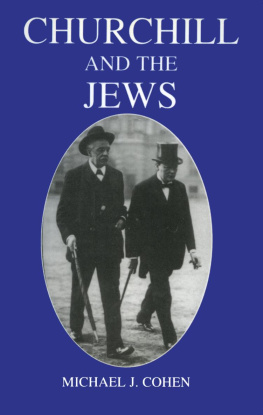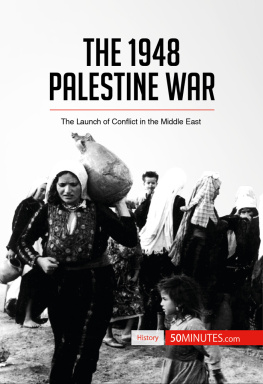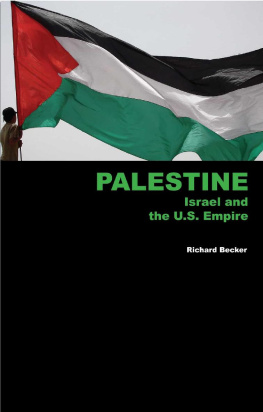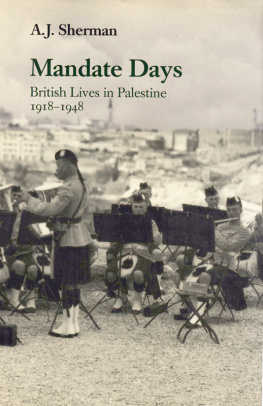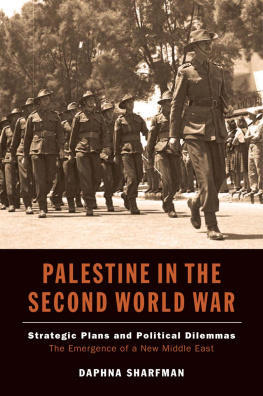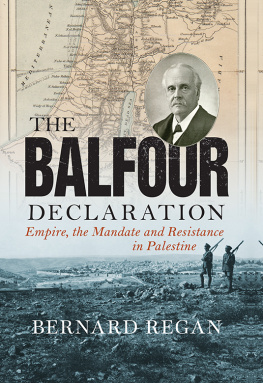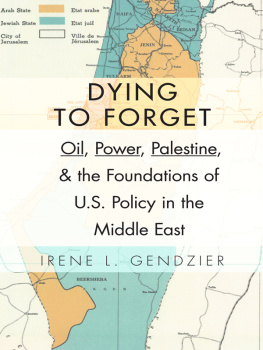PALESTINE TO ISRAEL
by the same author
Palestine, Retreat from the Mandate, 193645 (1978)
Palestine and the Great Powers, 194548 (1982)
Churchill and the Jews (Cass, 1985)
The Origins and Evolution of the Arab-Zionist Conflict (1987)
Editor
The Weizmann Letters. 2 vols. 194043; 194345 (1979)
The History of the Founding of Israel: Part III. The Struggle for the State of Israel, 193948 (12 volumes-documents) (1988)
Forthcoming
Truman and Israel
PALESTINE TO ISRAEL
From Mandate to Independence
MICHAEL J. COHEN
Professor of History, Bar Ilan University
First published 1988 in Great Britain by
FRANK CASS & CO. LTD.
2 Park Square, Milton Park,
Abingdon, Oxon, 0X14 4RN
and in the United States of America by
FRANK CASS & CO. LTD.
270 Madison Ave,
New York NY 10016
Transferred to Digital Printing 2006
Copyright 1988 Michael J. Cohen
British Library Cataloguing in Publication Data
Cohen, Michael J.
Palestine to Israel : from mandate to independence
1. PalestineHistory19171948
I. Title
956.9404 DS126
ISBN 0-7146-3312-7
Library of Congress Cataloging-in-Publication Data
Cohen, Michael J.
Palestine to Israel: from mandate to independence / Michael J.
Cohen
p. cm.
ISBN 0-7146-3312-7
1. PalestineHistory19171948. 2. MandatesPalestine.
3. Jewish-Arab relations19171948. I. Title
DS126.C5324 1988
956.9404dcl9 87-31980 CIP
All rights reserved. No part of this publication may be reproduced in any form or by any means, electronic, mechanical, photocopying, recording or otherwise, without the prior permission of Frank Cass and Company Limited.
Contents
FOR RACHEL AND DOV
Acknowledgements
, in the Wiener Library Bulletin, 1978, vol. XXXI, New Series nos.4546, by permission of the Wiener Library.
Crown copyright records appear by permission of the Controller, Her Majestys Stationery Office.
Introduction
If there is any single theme running through this book, it is the inner motivations, the strategy, and the self-interest that lay behind the intervention of the Great Powers (primarily Great Britain, but after World War Two, the United States, decisively) in what became known as Palestine, after World War One, and Israel after 1948. The inner thoughts of officials and civil servants, and of the statesmen involved Balfour, Churchill, Lloyd George, Bevin; Roosevelt, Truman; Ben-Gurion and Weizmann are laid bare by an investigation of the documents each left in private and public archives. In a word, emphasis has been laid on the formulation of policy, far away from the public eye, in the back corridors of power.
This collection begins with two pieces on Winston Churchill, still considered widely as quintessentially the sympathetic, pro-Zionist statesman. This is a view that I have recently attempted to revise (Churchill and the Jews, Frank Cass, 1985), and the articles re-printed here attempt to base that revision on some hard, none-too-pleasant facts concerning Churchills attitudes and policies towards the Jewish National Home, during the earliest, perhaps most critical years. The views quoted in these two essays represent fairly, in my opinion, the imperialist approach of the Conservative establishment in England to Palestine and to the Middle East. They also demonstrate that during the 1920s, when Churchill himself was Chancellor of the Exchequer, British policy in Palestine did not match up to the pious promise made in 1917 at least, not in the opinion of Lord Balfour himself.
examine the changes in British policy during the 1930s that resulted from the deteriorating international situation, and turmoil within the Arab world and in Palestine. These changes culminated in a reversal of the Balfour Declaration policy of encouraging Jewish growth in Palestine. The 1939 White Paper fixed definite limits to further Jewish immigration (unless with Arab assent) and land purchases, and provided for the establishment of an independent (i.e. Arab) state in Palestine within ten years.
shows, the reed of Churchills support for the Zionist cause was broken in 1944, when his close friend, Lord Moyne, was murdered in Cairo by Jewish terrorists. Churchill turned down all Zionist appeals for support during the next four years of struggle that preceded the establishment of the state of Israel.
As Britain became ever more dependent on its American ally, both during, and after the war, so it became increasingly apparent that any political scheme for a Palestine settlement would have to be approved of by the United States, given its large and influential American Jewish community. summarises the developments that made the British surrender of the Palestine Mandate in 1948 inevitable.
Churchill and the Balfour Declaration: The Interpretation, 19201922
CHURCHILL AND THE EMPIRE
For Winston Churchill, the empire represented a combination of romanticism and national self-interest. In his view, it was a possession that gave to Britain a world position and prestige that it would not otherwise have enjoyed, and whose absolute retention was essential. But the empire he referred to, and to which he would remain attached until well after World War II, comprised those territories which he himself had toured and at times fought over at the turn of the centurythe Northwest Frontier of India, Sudan, and South Africa. These areas, together with black Africa and of course Egypt, with its vital imperial artery the Suez Canal, made up the true empire. The Middle Eastern territories conquered during World War I, those the military termed the New Provinces, were considered by Churchill to be superfluous, extravagant additions to an already overextended imperial burden.
After World War I, Churchill believed that the key to a stable Middle East lay in the pacification of the Turkish nationalists. He opposed David Lloyd Georges policy of supporting Greek territorial ambitions in Asia Minor, a policy that Churchill feared would drive the Turks into the arms of the Bolsheviks, who would then both sweep down on the Middle East at incalculable cost to British interests in the area. Churchill pursued this line consistently until the Chanak crisis in 1922.
In a memorandum submitted to Lloyd George in October 1919, Churchill proposed that the European powers divest themselves of their Middle Eastern acquisitions, insisting that the partition of the Ottoman Empire had been a mistake. He regarded Britains sponsorship of Zionism as one more superfluous, complicating factor: Lastly there are the Jews, whom we are pledged to introduce into Palestine and who take it for granted that the local population will be cleared out to suit their convenience.
Churchills anxieties about the Middle East reflected a widespread public and parliamentary campaign for retrenchment in the region. The Iraqi uprisings during the summer of 1920 persuaded Churchill even more of the need to dispense with the Middle Eastern mandates. In a letter written at the beginning of December 1920, he referred to the terrible waste and expense which the Middle East is involving us in and grumbled, I deeply regret and


